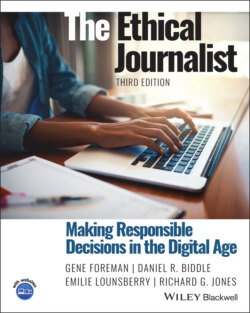Читать книгу The Ethical Journalist - Gene Foreman - Страница 30
Learning Goals
ОглавлениеThis chapter will help you understand:
the definition of ethics – discern what is right and wrong, then act on what is right;
how ancient societies developed systems of ethics;
how ethics and the law are similar and how they differ;
how people’s values shape the choices they make;
the meaning of the term ethical dilemma; and
how an ethical person makes decisions.
VIRGINIA GERST KNOWS something about ethics. In May 2003, when she was arts and entertainment editor for the Pioneer Press chain of weeklies in the Chicago area, she ran a critical review of a restaurant. (The baby back ribs “tasted more fatty than meaty.” Several other dishes were “rather run‐of‐the‐mill.”)
That displeased the restaurant owner, who was both a prospective advertiser and county president of the restaurant owners’ association. To placate the restaurateur, the Pioneer Press publisher had an advertising executive write a second review, one that would be positive. Gerst was ordered to run it. Instead, she quit.
“I understand that these are tough times for newspapers,” she wrote in her letter of resignation. “But economic concerns are not sufficient to make me sacrifice the integrity of a section I have worked for, cared about, and worried over for two decades.” 1
John Cruickshank understands ethics, too. In the midst of a management upheaval in November 2003, this career journalist was thrust into the job of publisher of the Chicago Sun‐Times (owned by the same company as the Pioneer Press weeklies). Months later, he discovered a breach of trust that astonished and angered him. Using accounting ruses that fooled even the agency responsible for auditing newspaper circulations, departed executives had been overstating the paper’s circulation by up to 50,000 copies a day. Cruickshank did not hesitate to go public with his discovery. This was not just a commendable display of candor; it was costly to a paper already a distant second to the Chicago Tribune. The paper was acknowledging that its advertisers had not been getting the exposure they had paid for, and it eventually had to repay those advertisers millions of dollars. 2
